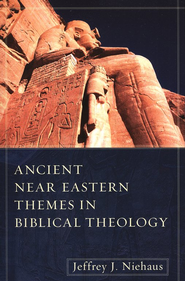Jeffrey Niehaus: Ancient Near Eastern Themes in Biblical Theology
 Jeffrey J. Niehaus, Ancient Near Eastern Themes in Biblical Theology (Grand Rapids: Kregel, 2008), 203 pages, ISBN 9780825433603.
Jeffrey J. Niehaus, Ancient Near Eastern Themes in Biblical Theology (Grand Rapids: Kregel, 2008), 203 pages, ISBN 9780825433603.
Jeffrey J. Niehaus (PhD, Harvard University) is professor of Old Testament at Gordon-Conwell Theological Seminary. His previous publications include God at Sinai: Covenant and Theophany in the Bible and Ancient Near East (Zondervan, 1995) as well as commentaries on Amos and Obadiah (Baker, 1992-93) and numerous journal articles. In the text now under discussion, Ancient Near Eastern Themes in Biblical Theology, Niehaus draws on research into ancient Near Eastern contexts to compare numerous parallels in (especially) the Old Testament (OT) and the Bible as a whole. Carefully researched and yet written in quite readable language, it is well organized and has a short but good bibliography and Scripture and subject indexes. This work should be an excellent resource for students, teachers, pastors, and Bible readers interested in understanding more deeply the cultural and spiritual background of the Holy Scriptures.
The Preface and first chapter identify Niehaus’ guiding principles. He writes reverently. He is convinced of God’s sovereignty over history and human cultures, and therefore contends that God has “allowed a variety of parallels to arise between theological concepts and practices in the ancient Near East and their counterparts in the Bible.” However, he thinks “there is not only a parallelism between certain themes in the Bible and its world, but there is also a structure of thought that is common to them both and that forms the theological backbone of the Bible.” Niehaus defends a strong doctrine of truth rooted in the biblical revelation. Yet he also defends the idea that ancient myths can contain elements of truth more plainly manifested in the Bible itself. Some try to account for this strange fact by positing some universal aspect of human nature and others simply see the Bible as dependant on pagan literature; but Niehaus looks at pagan literature through the lens of the Bible rather than the converse. In a word, Niehaus parts company with much of contemporary ancient Near Eastern and OT scholarship. He plainly does not see the Bible as dependant on pagan literature. Rather, he thinks the biblical revelation draws on preexisting and widespread cultural thought constructs to communicate divinely revealed eternal truth.
Niehaus argues, first, that the OT preserves true and accurate accounts of major events (e.g., Creation, the Flood), but that extra biblical sources may also “preserve the memory of such events”, albeit in distorted forms. Second, he argues that the OT uses literary and legal forms current in surrounding cultures as vehicles of special revelation. Third, he argues that the parallels between these appear “because God allowed concepts that are true of him and his ways to appear in the realm of common grace.” Accordingly, the Old and New Testaments complete and fulfill “the shared theological structure of ideas” that already existed in the ancient Near East. He goes farther, however, insisting that this shared theological structure provides “the theological backbone of the whole Bible.” He readily admits that in the ancient Near East the shared structure eventually became “blurred” and that in modern western cultures it has been “abandoned”; it is only “kept alive” in the Church, “God’s people, who continue to be his temple and to advance his kingdom, until he returns to establish it once and for all, for all time, and for all who believe in him.”
Category: Biblical Studies, Pneuma Review, Winter 2010


